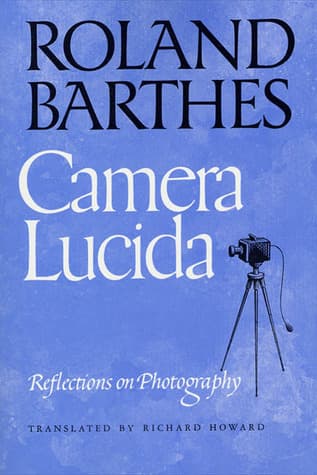
Book Review Summary: Camera Lucida: Reflections on Photography
Introduction
"Camera Lucida: Reflections on Photography" by Roland Barthes is a groundbreaking book that explores the essence of photography and its impact on the human mind. Published in 1979, it has become one of the most influential books on the subject of photography, alongside Susan Sontag's "On Photography." Barthes, a French literary theorist, philosopher, and critic, delves into the nature of photography, examining its relationship with language, culture, and the human experience. In this article, we will delve into the book's main ideas, analyze readers' opinions, and discuss why it has garnered such acclaim.
About Roland Barthes
Roland Gérard Barthes was a French literary theorist, philosopher, linguist, critic, and semiotician. Born in 1915, Barthes was a prolific writer who made significant contributions to various fields, including structuralism, semiotics, social theory, design theory, anthropology, and post-structuralism. His ideas explored the intersections between literature, culture, and society, and he was known for his ability to analyze complex concepts with clarity and insight. Barthes' work has had a profound impact on contemporary thought and continues to be studied and admired by scholars and enthusiasts alike.
Analysis of Views
- The Essence of Photography: Barthes attempts to find the essence of photography by examining its structural properties. He argues that photography operates outside the codes of language and culture, affecting the body as much as the mind. Through his analysis, Barthes establishes photography as a unique medium that renders death and loss more acutely than any other.
- The Photographic Referent: Barthes explores the relationship between photography and reality. He suggests that photographs are not mere representations of the world but rather emanations of the referent itself. Photographs capture moments that have already passed and freeze them in time, creating a sense of nostalgia and loss.
- The Punctum: Barthes introduces the concept of "punctum," a term he uses to describe the aspect of a photograph that holds our gaze without condescending to mere meaning or beauty. Punctum is often a small detail or element that resonates with the viewer on a deeper level, evoking emotions and memories.
- The Studio: Barthes distinguishes between two planes of the image: the studium and the punctum. The studium refers to the manifest subject, meaning, and context of the photograph. It encompasses everything that belongs to history, culture, and even art. The punctum, on the other hand, represents the aspect of a photograph that pierces our consciousness without necessarily adhering to conventional beauty or meaning.
- Personal Reflections: Throughout "Camera Lucida," Barthes incorporates personal reflections on his mother's death and his own grief. The book serves as a poignant eulogy to his mother and a meditation on loss and mourning. Barthes' vulnerability and honesty make the book deeply moving for readers who can relate to his experiences.
- Photography as Art: Although Barthes does not provide a comprehensive analysis of photography's status as art, he acknowledges its power to evoke emotions and create meaning. He argues that photography is not solely about technique or skill but rather about capturing moments and rendering them in a way that resonates with viewers.
Reasons for Recommendation
- Intimate and Soul-Stirring: Readers recommend "Camera Lucida" for its intimate nature and ability to stir emotions. The book's exploration of photography as a medium that evokes love and grief makes it a powerful read for those seeking a deeper understanding of the human experience.
- Thought-Provoking: Barthes' philosophical approach to photography challenges readers to think critically about their own perceptions and experiences with photographs. His ideas encourage readers to question their assumptions about reality, beauty, and meaning in art.
- Intricate Meditation: The book's structure as a series of essays allows Barthes to delve into various aspects of photography while maintaining a cohesive narrative. The essays are intricate and quirky, making for an engaging read that keeps readers engaged from start to finish.
Reasons for Not Recommendation
- Lack of Comprehensive Analysis: Some readers find that Barthes does not provide a comprehensive analysis of photography's technical aspects or its role in contemporary media and culture. While he explores some aspects of photography, he does not delve deeply into specific techniques or trends in photography.
- Personal Nature: The book's personal nature may not appeal to readers who prefer more objective analyses of artistic mediums. While Barthes' personal reflections add depth to his exploration of photography, they may detract from the overall academic rigor of the book for some readers.
Conclusion
"Camera Lucida: Reflections on Photography" by Roland Barthes is a thought-provoking book that challenges readers to reconsider their perceptions of photography as a medium. Through his exploration of the essence of photography and its relationship with language, culture, and human experience, Barthes establishes himself as a pioneering thinker in the field. While some readers may find the book's personal nature limiting or lacking in comprehensive analysis, others appreciate its intimate approach and its ability to evoke emotions and inspire reflection. Overall, "Camera Lucida" remains an important work in the study of photography and an essential read for those interested in exploring the complexities of this fascinating medium.